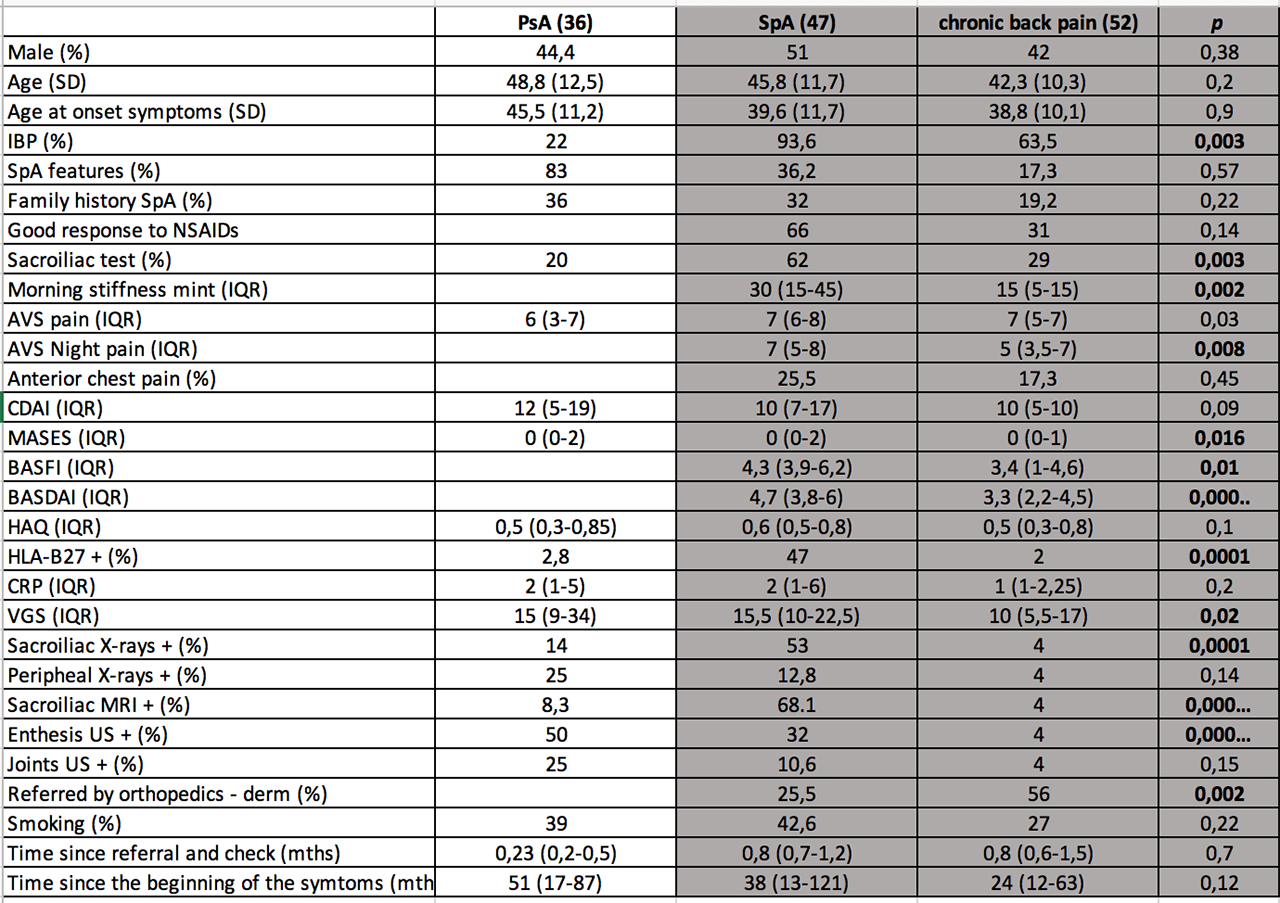Session Information
Session Type: Poster Session (Sunday)
Session Time: 9:00AM-11:00AM
Background/Purpose: In our region, the lack of knowledge, timely referral and access to laboratory tests and images are the main causes in the diagnostic delay of spondyloarthritis (SpA), which is estimated between 6 and 10 years. Objectives: To evaluate the delay between the onset of symptoms, referral and access to the fast-track diagnosis program. To compare the differential characteristics in patients with axial symptoms.
Methods: Patients older than 18 years who entered a Rheumacheck-SpA were included according to the following criteria: peripheral arthritis plus at least one SpA feature (ASAS 2006) or low back pain of 3 months of evolution that began before 45. Patients were perfomored at the same day: blood analysis with acute phase reactants, HLA B27 (low back pain), sacroiliac X-r, sacroiliac MRI, joint and entheses ultrasonography (regardless of symptoms), sociodemographic data , characteristics of the disease (eg: age of onset), clinimetry and treatments. The symptom evaluator was unaware of the results of the complementary studies that were collected by another observer. Previously, a plan of awareness was made to the local community, physicians and health personnel involved (media campaigns, social networks and referral talks). Statistical analysis: descriptive statistics were carried out and, Chi2 and Fisher’s exact test (categorical variables) and Student’s Test or Mann Whitney (continuous variables) were applied.
Results: 135 patients entered the fast-track diagnosis program for 18 months, 99 with axial symptoms and 36 with peripheral symptoms. 53% female, average age 45.5 yrs (11.3), 74% were employed. SpA feature 40% (77% psoriasis, 10% uveitis, 3% IBD), SpA family history 26% (70% psoriasis, 15% SpA, 10% IBD). Of the patients with peripheral symptoms, 100% met criteria for psoriatic arthritis; and patients with axial symptoms 47.5% (95% CI 33-58) met ASAS criteria for axial SpA. Median delay since symptoms began at diagnosis were 37.7 months (RIC 12-85). Those patients referred by specialists (orthopedics-Dherm) had a delay of 0.75 months (RIC: 0.55-1.3). 25% of patients with a diagnosis were referred after the awareness campaign and 55% attended because saw the social media ads. Table 1 shows the differences between patients.
Conclusion: The delay from the onset of symptoms and access to the program (final diagnosis) was 3 years, and the delay of referral by another specialist was less than one month, 70% attended after the awareness campaign. Patients with axial SpA diagnoses had distinctive clinical, laboratory and imaging characteristics.
To cite this abstract in AMA style:
Sanchez Prado E, Ruta A, Torres Chichande J, Ruta S, Magri S, Salvatori F, Garcia Salinas R. Rheumacheck – Spondyloarthritis: Comprehensive Fast-track Diagnosis Program. What Benefits Does It Offer in a Developing Country? [abstract]. Arthritis Rheumatol. 2019; 71 (suppl 10). https://acrabstracts.org/abstract/rheumacheck-spondyloarthritis-comprehensive-fast-track-diagnosis-program-what-benefits-does-it-offer-in-a-developing-country/. Accessed .« Back to 2019 ACR/ARP Annual Meeting
ACR Meeting Abstracts - https://acrabstracts.org/abstract/rheumacheck-spondyloarthritis-comprehensive-fast-track-diagnosis-program-what-benefits-does-it-offer-in-a-developing-country/

